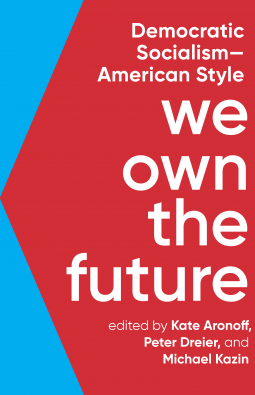
We Own the Future
Democratic Socialism—American Style
by Edited by: Kate Aronoff Peter Dreier Michael Kazin
This title was previously available on NetGalley and is now archived.
Send NetGalley books directly to your Kindle or Kindle app
1
To read on a Kindle or Kindle app, please add kindle@netgalley.com as an approved email address to receive files in your Amazon account. Click here for step-by-step instructions.
2
Also find your Kindle email address within your Amazon account, and enter it here.
Pub Date Jan 07 2020 | Archive Date Jan 07 2020
Talking about this book? Use #WeOwntheFuture #NetGalley. More hashtag tips!
Description
A stunningly original and timely collection that makes the case for "socialism, American style"
It's a strange day when a New York Times conservative columnist is forced to admit that the left is winning, but as David Brooks wrote recently, "the American left is on the cusp of a great victory." Among Americans under thirty, 43 percent had a favorable view of socialism, while only 32 percent had a favorable view of capitalism. Not since the Great Depression have so many Americans questioned the fundamental tenets of capitalism and expressed openness to a socialist alternative.
We Own the Future: Democratic Socialism—American Style offers a road map to making this alternative a reality, giving readers a practical vision of a future that is more democratic, egalitarian, inclusive, and environmentally sustainable. The book includes a crash course in the history and practice of democratic socialism, a vivid picture of what democratic socialism in America might look like in practice, and compelling proposals for how to get there from the age of Trump and beyond.
With contributions from some of the nation's leading political activists and analysts, We Own the Future articulates a clear and uncompromising view from the left—a perfectly timed book that will appeal to a wide audience hungry for change.
Table of Contents
Part I: Is a New America Possible?
Introduction
Kate Aronoff, Peter Dreier, and Michael Kazin
How Socialists Changed America
Peter Dreier and Michael Kazin
Toward a Third Reconstruction
Andrea Flynn, Susan Holmberg, Dorian Warren, and Felicia Wong
A Three-Legged Stool for Racial and Economic Justice
Darrick Hamilton
Democratic Socialism for a Climate-Changed Century
Naomi Klein
Part II: Expanding Democracy
Governing Socialism
Bill Fletcher Jr.
We the People: Voting Rights, Campaign Finance, and Election Reform
J. Mijin Cha
Confronting Corporate Power
Robert Kuttner
Building the People's Banks
David Dayen
Democracy, Equality, and the Future of Workers
Sarita Gupta, Stephen Lerner, and Joseph A. McCartin
Who Gets to Be Safe? Prisons, Police, and Terror
Aviva Stahl
On Immigration: A Socialist Case for Open Borders
Michelle Chen
On Foreign Policy: War from Above, Solidarity from Below
Tejasvi Nagaraja
Part III: The Right to a Good Life
Livable Cities
Thomas J. Sugrue
What Does Health Equity Require? Racism and the Limits of Medicare for All
Dorothy Roberts
The Family of the Future
Sarah Leonard
Defending and Improving Public Education
Pedro Noguera
Reclaiming Competition: Sports and Socialism
David Zirin
What About a Well-Fed Artist? Imagining Cultural Work in a Democratic Socialist Society
Francesca Fiorentini
How Socialism Surged, and How It Can Go Further
Harold Meyerson
Afterword: A Day in the Life of a Socialist Citizen
Michael Walzer
Available Editions
| EDITION | Other Format |
| ISBN | 9781620975213 |
| PRICE | $17.99 (USD) |
| PAGES | 256 |
Average rating from 2 members
Featured Reviews
 Julie P, Librarian
Julie P, Librarian
We Own the Future is well-written, well-organized, and well-timed, tackling democratic socialism from numerous angles to produce an engaging book. Readers familiar with the topic, as well as those motivated by current policy debates to learn more, will find the book informative and interesting.



